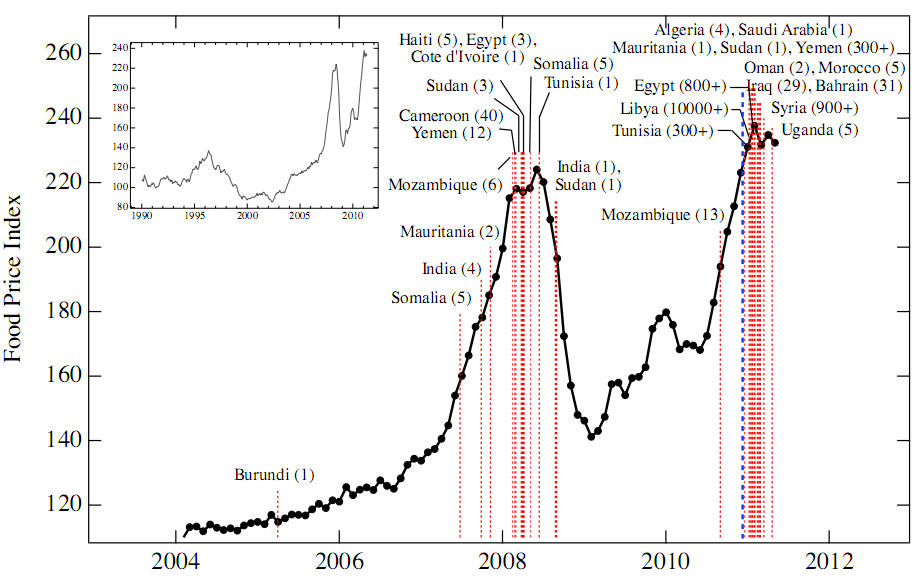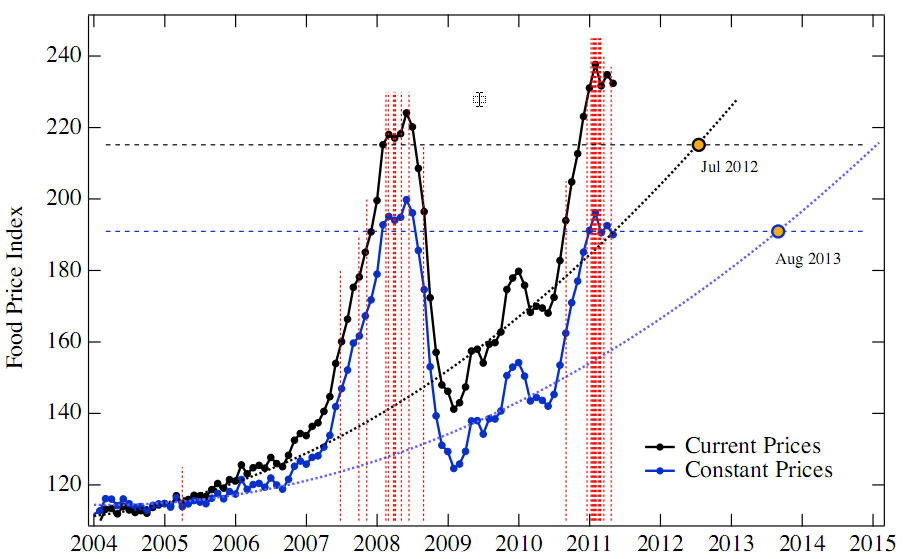It makes some sense. For as much as we all want to be higher order beings, if our baser needs are not met, a lot of other things no longer take precedence. In India a few years ago, a western activist group dumped GM food in the middle of a city as a protest - but people swarmed over it and ate it. That has more success in a Whole Food parking lot where wealthy middle class women and anti-science hippies can give themselves an intellectual placebo, but poor people want to eat.
The analysts in this arXiv paper kept it simple. They mapped the food price index of the Food and Agriculture Organization of the UN, which plots the price of food against time, and the date of food riots in North Africa and the Mid-East.
Presto. On that chart, when the food price index rises above a certain threshold, there is trouble.

Time dependence of FAO Food Price Index from January 2004 to May 2011. Red-dashed
vertical lines correspond to beginning dates of food riots and protests associated with the major
recent unrest in North Africa and the Middle East. The overall death toll is reported in parentheses. Blue vertical line indicates the date, December13, 2010, on which they submitted a report to the U.S.government, warning of the link between food prices, social unrest and political instability. Inset shows FAO Food Price Index from 1990 to 2011. Credit: see reference below.
Too simple? Perhaps. We know there have been more riots in Africa and the Mid-East, so if a Republican wants to claim a domino effect for President G.W. Bush implementing democracy in Iraq, it's easy to do it the same way, when there are two data sets and causation wants to be implied. It's typical mapping of data to the topology you want.
It's also fair to note that in countries where subsidies are common and government programs are the norm, problems will obviously break out when that changes. The Euro was high for years and dopier Europeans were thumbing their noses at America, insisting that was some kind of cultural and economic vindication, while actual policymakers in Europe were livid toward Bush (him again - no one hates Obama, he vacations too much to be hated), they didn't think a high Euro was good and there was a widespread belief he let the dollar fall to penalize the large European countries who were against his decision to go into Iraq. Because so much of European agriculture is subsidized - Europe alone is 85% of the agriculture subsidies for the planet - a high Euro meant they were having to lose a lot more money on every cow. Europeans believed it was retaliation because it hurt Europe the most and a low dollar meant American exports spiked because they were now cheaper.
So on that basis it's not hard to see that in any country where food is subsidized, like those in the Mid-East and Africa, food that becomes more expensive means more problems will arise.
Using just American farming, we could feed the world but politics and culture get in the way; ethanol was touted as a science solution to oil by Al Gore and environmental activists, for example, but it turned out to instead be what impartial scientists said all along - a spike in food prices and no decrease in emissions despite claims of economic magic 'capitalism will drive prices down and efficiency up' theory if it's subsidized. Meanwhile, valid science solutions like genetically modified foods that can grow in difficult climates worldwide are protested by environmental activists. Then in some countries we have cultural pressure - various activist groups want to outlaw, overtax and regulate some types of food.
The complexity theorists in the paper state that food riots commonly occur above a threshold of the FAO price index of 210. That means persistent riots will begin in April, 2013 if current prices, adjusted for inflation, continue at current trends.

There is a solution, obviously, and it isn't for rich Western countries with liberal guilt to demonize each other and steal more money from citizens and then redistribute it in typically inefficient fashion. The solution is to let science solve the problem; to-date, genetically modified foods haven't caused a single stomachache despite over a decade in common use and 25 years of research.
Science can make foods more resistant to pests, meaning more food on less land, it can make foods grow in difficult climates, meaning less transportation costs and resulting emissions that are better for the climate. GM cotton and corn have been fantastic successes - they have reduced insecticides overall and led to lower mycotoxin levels in our corn, but even if you don't care about the environment or health, the economics of GM products can't be ignored.
Citation: M. Lagi, K.Z. Bertrand, Y. Bar-Yam, The Food Crises and Political Instability in North Africa and the Middle East. arXiv:1108.2455





Comments